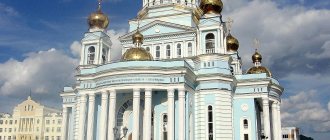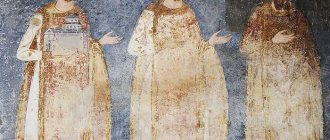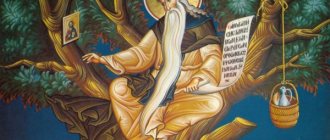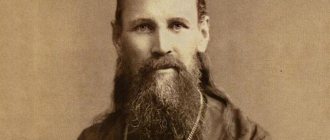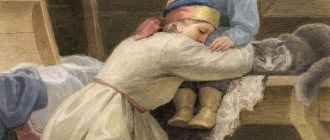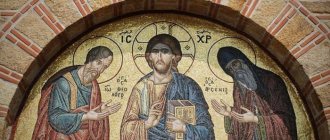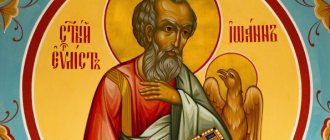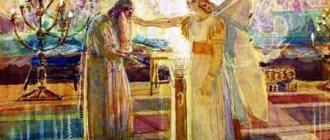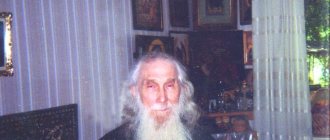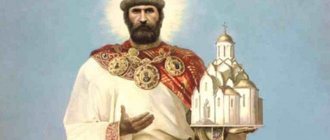Fedor Fedorovich Ushakov is an invincible admiral, Russian naval commander. Admiral Ushakov won 43 naval battles, and at the same time, without suffering more than one defeat.
In 2001, the Russian Orthodox Church canonized him as a saint. Memorial Day of Feodor Ushakov on August 5 and October 15.
Fedor Fedorovich Ushakov - Russian naval commander, won 43 naval battles, and at the same time, without suffering more than one defeat
Feodor Ushakov was born on February 13, 1745 in the village of Burnakovo
Admiral of the Russian Fleet - Feodor Ushakov, was born on February 13, 1745 in the village of Burnakovo, Romanovsky district. His parents came from an ancient noble family, although they were not at all rich. But they were kind and pious people, they believed in God.
Theodore's father, Feodor Ignatievich, was an admiral and served in the guard. He had to fight the Turks, but after the third child born into his family, he was dismissed from service. Therefore, he decided to return to his native village to take care of simple household chores and raising his beloved children.
13 February 1745
Feodor Ushakov was born
The boy was born on the day of remembrance of two warrior-great martyrs - Theodore Stratelates and Theodore Tyrone. It was in honor of them that Theodore was named.
His whole life passed under the beneficial influence of his uncle, Theodore of Sanaksar, a warrior in spiritual warfare.
The Monk Theodore of Sanaksar grew up in these same places, after which he went to serve in the capital's guard. But his soul lay more towards spiritual service. He fled to the forest to perform prayers and fasts there.
When they found him, they sent him to the empress, who left him in the Alexander Nevsky Lavra. There he took his monastic vows.
The whole life of Theodore Ushakov passed under the beneficial influence of his uncle, Theodore of Sanaksar, a warrior in spiritual warfare.
At the temple, which was located near the village of Burnakovo, Theodore was baptized. There he studied literacy at a school for noble children. His parents really wanted to instill in him high religious feelings, especially since his uncle was an example for him.
KERCH SEA BATTLE (1790)
After the defeat at Fidonisi, Turkish commanders were instructed to take revenge. The ships of Ushak Pasha, as the Turks called Ushakov, were ordered to be destroyed. However, a series of clashes with the growing Russian fleet showed Ushakov's superiority. Even a superior enemy could not withstand the lightning-fast and unconventional decisions of the commander-in-chief. The advantage of the rear admiral was the rejection of habitual and stereotypical actions and moves. The Turks could not predict Fyodor Fedorovich's plans and inevitably suffered defeat. Even superiority in firearms could not save the enemy from defeat, since Ushakov skillfully fought at very close ranges and used all possible artillery and guns. On July 8, 1790, a battle took place near the Kerch Strait between the Russian squadron under the command of Rear Admiral Ushakov and the stronger and more equipped Turkish fleet of Kapudan Pasha Hussein. During the battle, the Russian squadron, led by Ushakov’s flagship 80-gun ship “Rozhdestvo Khristovo”, again won a victory over the Turks, which did not allow the Ottoman Empire to land its troops in the Crimea. This clash can be called a battle very conditionally, since when Ushakov’s forces were discovered, the Turks hastily and disorganizedly began to retreat. Fyodor Fedorovich could only go on the offensive and destroy the enemy ships.
After Theodore turned 16 years old, he was enrolled in the naval cadet corps
After Theodore turned 16 and had good skills, being able to count and write, he was enrolled in the naval cadet corps in 1761. The future admiral studied well, treated his subjects responsibly and conscientiously.
He showed great interest in arithmetic, navigation and history. After graduation, he received an officer's rank and was sworn in.
First, Theodore was sent to the Baltic Sea fleet.
The first years there were spent under the guidance of experienced and wise sailors. After his stay in this place, he left only good impressions. Then he was sent south to the Azov flotilla.
Soon, at the end of the 17th century, the state task was put forward to return the Black Sea coast to Russia. It was then that Empress Catherine II decided to create a foundry fleet on the Black Sea.
A little later, 30 versts above the mouth of the Dnieper, the port and city of Kherson was founded. They began to build slipways for ships, but construction was delayed because there were no materials.
In 1783, Feodor Ushakov arrived in Kherson. At the same time, the time of plague began. Quarantine began, so all efforts were aimed at fighting the plague. The construction of ships stopped.
Empress Catherine II decided to create a foundry fleet on the Black Sea. In 1783, Feodor Ushakov arrived in Kherson
Feodor Ushakov also contributed all possible assistance in the fight against the disease, for which he was awarded the Order of St. Vladimir of the fourth degree. Soon Crimea was annexed to Russia.
Catherine the Second issued a decree that they began to build new fortifications. Feodor Ushakov arrived there.
In 1787, Türkiye declared war on Russia. The Turkish fleet consisted of 17 battleships and 8 frigates, and in the Russian squadron there were only 2 battleships and 10 frigates.
The Russians at that moment were commanded by Ushakov. Victory was theirs. Although the Russian fleet had no chance, since the enemy had the advantage, Ushakov's personal courage and selflessness prevailed in their favor.
In 1787, Türkiye declared war on Russia. Although the Russian fleet had no chance, since the enemy had the advantage, Ushakov's personal courage and selflessness prevailed in their favor
With shackles - a mistake
The famous ship took part in many of Ushakov’s campaigns, and also in the most brilliant battle, the Battle of Cape Kaliakra.
1791 The Black Sea Fleet matured, infuriating with its victories our long-time enemy - the Ottoman Empire, which considered the Black Sea the “Lake of the Turkish Sultans”. Calling on the Algerians for help, the Sublime Porte prepares to deal the final blow to the Russians. The storm of the Mediterranean is headed by the armada of ships, the Algerian admiral Said-Ali. It is he who promises Sultan Selim III to deliver Ushakov to Constantinople on a chain and in shackles.
It turned out differently. On the morning of July 31, 1791, our ships find the Turkish fleet off Cape Kaliakra. As usual, the forces are unequal. The Turks have 2,000 guns against our 1,000 and the Ottomans have 20,000 against the Russians' 9,500. From the shore, their squadron is covered by a battery.
On that day, the Ottomans celebrated Ramadan Bayram, and some of the crew even celebrated it - on the shore. Ushakov, who paid great attention to intelligence, instantly makes a brilliant decision. And he makes a maneuver that will be included in all textbooks of military art. Without wasting time rebuilding “in the battle line” and thereby violating all the rules of engagement, he rushes into the gap between the Turkish fleet and the shore. And then, under fire from coastal batteries, he attacks the enemy. Not only did the Ottomans not expect the Russians, but they also did not understand the maneuver. The disastrous confusion of the Turks allows our ships to engage in close combat, taking for a time “as allies” the coastal batteries, which, until they came to their senses, were hitting both yours and ours. Despite its apparent simplicity, Ushakov’s maneuver was as daring as it was dangerous - do not jump out onto the sandbank, do not rush under enemy guns, do not hesitate when turning... As for Ushakov’s violation of the rule “before the battle, line up in the battle line,” then it is worth saying that in 1757, the English admiral Byng was executed for this, and it was no coincidence. Rules in military affairs are the result of many years of experience, paid for with someone's lives. To break them, winning and not dying, audacity and luck are not enough. Ushakov’s courage was based on the confidence that he and each of the crew of his 20 ships were a single whole. Yes, there are years of training behind this. But not only. Let us listen to the observant Greeks, who were amazed at the unity of the Russian soldiers. Surprised by Ushakov’s religiosity, merchant Nikolai Paschalis wrote: “The piety of Ushakov, like other Russians, is amazing. Incredibly, every Sunday all soldiers want to attend the Divine Liturgy, and six churches are allocated for them. In the same way, he and the others go to mass at St. Spyridon or to the monastery of the Mother of God.” Drill alone is not enough for unity, and caring for everyone may not be enough. The skill of common prayer also worked here.
But let's return to the Turks. The capital of the Sublime Porte remembered the morning of the next day for a long time. The first rays of the sun, having dispersed the darkness, illuminated the outcome of the military campaign, gilding the wreckage of the once great squadron. “Frightened at the sight of his ships, demasted and completely broken,” Catherine II would later write about Selim III, “he immediately gave the order to end (peace negotiations) as soon as possible... and His Highness, who had been arrogant 24 hours ago, became soft and accommodating like a calf."
In 1790, Ushakov received the rank of rear admiral
In 1790, Ushakov received a rear admiral and was appointed commander of the Black Sea Fleet. In the same year, Rear Admiral Ushakov again won a victory near the Kerch Strait.
Ushakov himself said that the Lord gives them all victories, because without his help they would not have succeeded.
Turkey attacked Russia several more times, but Ushakov and his team always won, throwing the enemy into confusion. After this, Turkey decided to have peace with Russia. In 1791, a peace treaty was concluded.
Ushakov was appointed chief of the port.
He began to repair all the ships, and also built piers on the shores of the bays. He built barracks and hospitals for sailors so that they would have a place to live. He also took care of the construction of roads, wells, and markets.
In 1793, the Empress personally summoned him and presented him with a folded cross of the holy relics of saints. That same year he received a promotion to vice admiral. Soon Emperor Paul I ascended the Russian throne.
Soon France began to incite Turkey to war with Russia. Turkey wanted to return its lands, but understood that they could not defeat Russia. Then they decided to go to France, in a letter to Ushakov, they asked for help.
The first task was the capture of the Ionian Islands, the main of which was the capture of the island of Corfu. At that time, on the island of Zante, a thanksgiving prayer service was held in the holy church of the Wonderworker Dionysius. Afterwards everyone venerated the relics of Saint Dionysius, including Theodore Ushakov.
Corfu was taken by the Russians, for which Theodore received the rank of admiral. Then, under the leadership of Suvorov, they defeated the French army.
Feodor Ushakov and Suvorov showed the whole world what the Russian army means
Malta still had to be taken, but Emperor Paul demanded that Ushakov return to his homeland, Constantinople. In 1801, conspirators killed Paul I, and Alexander I ascended his throne.
Politics changed dramatically, Ushakov was sent to St. Petersburg. Here Ushakov served as the chief commander of the Baltic Rowing Fleet. He performed all his duties with special zeal and diligence.
BATTLE NEAR THE ISLAND OF FIDONISI (1788)
On July 14, 1788, in a battle near Zmeiny Island (otherwise called Fidonisi), thanks to the resourceful actions of 4 frigates under the command of Ushakov, Turkish ships outnumbered Russian forces several times (the Turkish squadron consisted of 15 battleships, of which five were 80-gun ), suffered a crushing defeat and were forced to flee.
The tactics of the talented captain of brigadier rank were quite simple: not to allow a ring to close around the Russian ships; to impose battle on the Turkish flagship, appointed to lead the entire course of the attack. The ability to discern the enemy’s intentions only by certain signs of formation and maneuvers, to instantly make an intelligent decision, as well as amazing courage and rejection of standard techniques and methods became a special feature that distinguished Ushakov from a number of other officers. This was the first victory of the fleet, a victory over significantly superior enemy forces, which had great psychological significance. Already in 1789 he was awarded the rank of rear admiral.
In 1806, Feodor Ushakov submitted his resignation
In 1806, Ushakov submitted his resignation. For some time he still lived in St. Petersburg, but still he was preparing to leave for permanent residence. His soul required peace and solitude to pray to God. He moved to the village of Alekseevka, near the Sanaksarsky monastery.
Fyodor Ushakov, in order to devote the rest of his days to God, moved to the village of Alekseevka, near the Sanaksarsky monastery
Soon the Patriotic War of 1812 began, but Theodore could not take part in it due to his illness. Theodore spent the rest of his days as a true Christian and a faithful son of the Church.
October 15
Memorial Day of Feodor Ushakov
In 1817, Theodore Ushakov, a righteous warrior, was buried in a monastery next to his relative from the nobility. The funeral service was held for Theodore's body in the Transfiguration Church in the city of Temnikov. He was buried next to his relatives, the venerable elder.
Nowadays, so much time has passed since the death of Feodor Ushakov, but his memory is not forgotten.
Many pilgrims come to Ushakov’s grave in the Sanaksar Monastery to worship, and requiem services are held.
He is remembered by soldiers and naval commanders, and by the entire Russian Orthodox Church. During the Great Patriotic War, the remains were desecrated by atheists, but were found in 1944.
Requiem services are held at the grave and many pilgrims come to worship.
Where are the relics of the saint?
After his death, Saint Theodore Ushakov was buried near the Sanaksar Nativity of the Theotokos Monastery, next to his uncle, the Venerable Theodore of Sanaksar.
The holy righteous Theodore Ushakov, admiral of the Russian Fleet, invincible naval commander, was canonized by the Russian Orthodox Church on August 6, 2000 as a locally revered saint of the Saransk diocese. The city temple in Saransk was consecrated in his honor.
During the Great Patriotic War, it became known that the relics of Feodor Ushakov became incorruptible. The question began to arise regarding the location of the relics. Under the leadership of a special commission, the grave of General Ushakov was opened, and a note appeared in the documents of the commission members that the body had not succumbed to the natural process of decomposition. The holy relics of Fyodor Ushakov are often taken around the cities of Russia, and many pilgrims always flock to them. The main places where the shrine containing the relics of Feodor Ushakov are located are naval bases.
The icon depicts Theodore in a military uniform with awards
The icon of St. Theodore Ushakov was painted as close as possible to the historical figure.
It depicts Theodore in a military uniform with the awards he earned for his victories. In his right hand he holds a scroll with prayers, and in the other - a weapon with which he struck his enemies.
The icon of St. Theodore Ushakov was painted as close as possible to the historical figure
In front of the icon they pray for the repose of deceased people who gave their lives for the good of their native country, and also pray for the health of soldiers who are serving.
For the Day of Remembrance, a kontakion and troparion were written for Theodore Ushakov
Troparion to Theodora Ushakov:
The unshakable archangel appeared to the Russian state, treating the Hagaryan malice as nothing and destroying him: neither worldly glory, nor seeking wealth, but you served God and your neighbor. Pray, Saint Theodora, to grant our army victory over our enemies, to grant our fatherland unshakable piety and the sons of Russia to be saved.
Kontakion to Theodore Ushakov:
Archangel of Russia, servant of the people of God, liberator of the poor and oppressed, punisher of the wicked, ask for what is useful to us and great mercy, as our supporter, righteous Theodore.
Prayer:
Come, righteous warrior Theodora, from the mountain villages to those who flow to you, and listen to their prayer: beg the Lord God to grant to all of us what we ask of Him for our salvation through your holy intercession. You have carefully carried out the great service entrusted to you, and with your help, guide us to remain in what we are called to do. You, having defeated the many adversaries, have brought down all visible and invisible enemies who have taken up arms against us. Ask the All-Merciful God: may the suffering Russian country be freed from the cruel atheists and their power, and may the throne of Orthodox kings be restored. Pray to the Lord God to grant a strong and inviolable peace, and fruitful lands, a shepherd who is holy, truth and strength by law, wisdom and invincible valor as a military leader, judgment as a mayor, your Russian fleet and all our troops, devotion to faith and the Fatherland, and invincible courage, to all Orthodox Christians health and piety. Save our Russian country and this holy monastery from all the slander of the enemy, so that in word and deed the all-holy name of the Father, and the Son, and the Holy Spirit will be glorified, now and ever, and forever and ever. Amen.
By leaving a comment, you accept the user agreement
